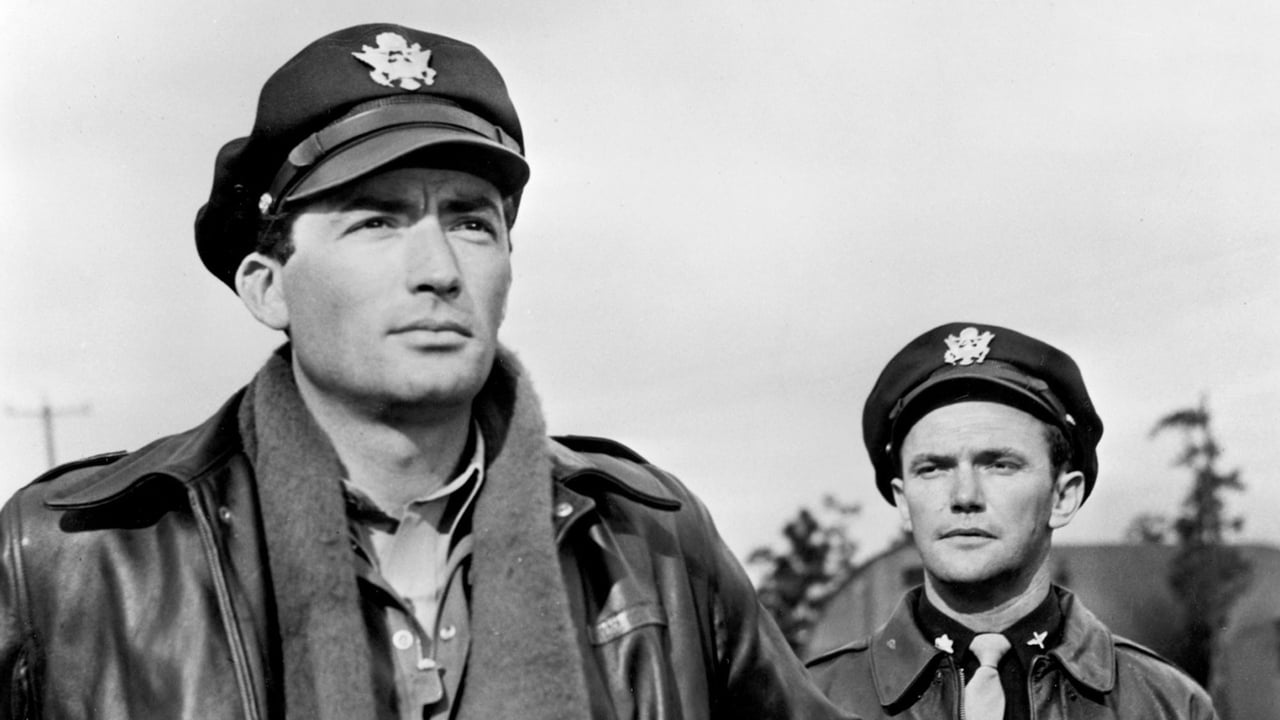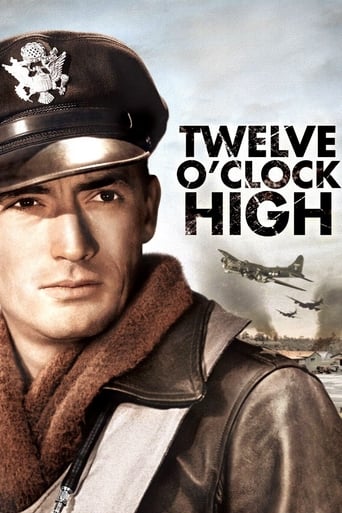

the audience applauded
... View MoreCharming and brutal
... View MoreIt’s fine. It's literally the definition of a fine movie. You’ve seen it before, you know every beat and outcome before the characters even do. Only question is how much escapism you’re looking for.
... View MoreThis film is so real. It treats its characters with so much care and sensitivity.
... View MoreThough I have seen most of HK's films thought I couldn't like this one as well. The theme appeared too familiar and too predictable for my taste. But HK worked his magic one more time again - the movie was made as it should, nothing more nothing less. This enables HK to pull through with success again: simplicity is his magic that works wonders from most common things. He only deals with what is essential and the result is a paradigm of film-making.
... View MorePlaced in charge of bomber unit, a hard-nosed general gradually softens as he realises the devastating mental impact on the soldiers under his command in this World War II drama. Gregory Peck gives a commanding performance as the general in question whose initial stance that "there isn't time" to "ease up" eventually vanishes as he learns more and more about the crippling effects of the near fatal missions on his troops. This is also one of the earliest movies to look at the psychological effects of war on individuals with a bitter irony in how the soldiers who survive their missions are only rewarded with more and more dangerous missions. For a film that wants us to sympathise with lowest ranking soldiers though, we get to know relatively few of them in any depth. Indeed, much of the film is spent on Peck and his subordinate officers debating how to treat their troops. This is not really a big detractor since Dean Jagger, Hugh Marlowe and others provide solid performances in such roles, but it does feel a little odd that we only get to see one bombing run in detail - and this insight comes relatively late into the film too. If one perceives the film as a character study of Peck's general first and foremost though, it is hard to disagree with the film's approach. Certainly, his character trajectory is easy to predict, but Peck is convincing every step of the way on the road to an eventual near complete change of heart. The film features some excellent audio and visual effects too even if the reliance on stock footage grows a tad irksome.
... View MoreEngland, 1942. The 918th bomber regiment, flying into Europe to deliver their payload to German targets, is a group suffering from low morale and even worse luck, with many pilots coming back dead, injured, or psychologically scarred from their daylight raids that are only growing tougher. Enter General Savage, played by Peck, who believes the problem lies with their CO, Colonel Davenport, a good soldier who has become too close to his men and thus lacks the necessary strong-arm discipline. Savage relieve the Colonel of his command, and brings the 918th under his wing, attempting to whip this hard luck group into shape. The film deals with the theme of leadership under stress, and how a commander will toe the line between protecting his men and sending them to their deaths. For a psychological drama on the effects of war on the chain of command, the film is undoubtedly good. Any military buff or WWII geek will get his worth for watching it. But for those interested in the actual bombing missions, bad news, as there is one bombing run and it only lasts for ten minutes in the last fourth of the movie. It consists of genuine war footage spliced in with the actors, and while it's certainly an effective sequence, it arrived too little too late to save the story, as I had already lost interest. The issue I took with the film was my lack of connection with any of the characters in the squadron, save for Savage. In the beginning, we are introduced to a man we think is the protagonist, who has a flashback to the events that sets the plot in motion; but it turns out he's only a side character who hardly has an effect on the story. If any character is the main one, it should have been Peck's Savage, but we don't meet him until twenty minutes in. There is also a distinct lack of notable personalities in the bomber crews Savage is attempting to win over. Essential scenes that would be obligatory in the telling of the tale are skipped over or told from an offhand source. In a pivotal moment, Savage is convinced his men will transfer out instead of staying. But another officer rushes in and informs him that all the men forgave their transfer orders, and opted to stay with the group. Surely this would have been a case where we should be shown this, and not just told in an anticlimactic fashion. Perhaps seeing the men all threatening to leave, but one brave soul tears up his transfer order, and the rest soon follow in an honourary echo. But because we never see this (indeed, barely see any of the grunts; most of the runtime is devoted to Peck's static character) the result of Savage's salvation is not convincing. Surely this imaginary scene I described would have given me a character in the group with a justifiable personality, who I would later then care about as much as Savage apparently does when they bite the dust at the end. But no, the 918th are just a faceless mass of men who we get glimpses of, but never get to really know. There are a couple choice scenes of men venting about why he's a bad commander, but we never get to see Savage do anything resentful or in any serious conflict with the group. The moments where bonds are forged and brotherhood is found, the battle scenes, are nonexistent except for one. The worst thing we see him do is close the bar for a night. There is also a subplot where he gives command to a deadbeat officer, in charge of a plane called the Leper Colony, and filled with the worst crewmen in the bomber group. Savage threatens to to rub his "face in the dirt" with this detail. But this relationship is soon forgotten by the director as well. It is at least resolved later in a touching scene at the hospital between Savage and the officer. It is revealed the man went through great personal sacrifice, having had to ditch the plane in the English Channel, and flying three missions with a fractured vertebrae. Again, the film makes a point of not throwing any of this exciting, hair raising action, but are instead just told about it. This starts to make the film bleed into monotonous scenes of indistinguishable sludge after a while. As the movie drags on, we do not get any of the bomber crew members showing up as major characters, and we don't see them struggling to get on with the General even as he flies on offscreen missions with them. All we get is exposition in the officer's club, with the generals and majors deciding on how best to run the unit. It's all very meticulous and cold, but lacks the humanity to make me care. The climax of the film involves General Savage having a nervous breakdown, as he ironically becomes too attached to his men for his own good. Let me go on to say that this is soon resolved in an almost arbitrary fashion, and the ending is as carefree and bland as could possibly be. For a detailed look into a commander's effort to run a regiment, there is much for the war buff. But the bomber crews seem to take a backseat to one man's struggle, and this just isn't enough to keep me invested for a two hour runtime.6.9/10
... View MoreThis movie is just plain out incredible. One of my favorite movies ever is Patton, and after watching 12 o'clock high, I can see how Patton got it's template. I'm sure many other movies copied the magic of 12 O'clock High. So many movies loose their focus by thinking they need a love interest planted into it. This movie didn't lower the bar and force that in. I spent 16 years of my life in three different services and all being aviation. For 6 years I was part of an aircrew, this movie kept it real all the way, I wish anything that modern movies would keep things as real as this movie did, a movie that was filmed over 50 years ago. Dean Jagger's character "Maj. Harvey Stovall" was just as important as Gregory Peck's "Gen. Frank Savage" part. Jagger was absolutely awesome as the action starved paper pusher that picks up exactly what Gen. Savage is putting down, helping him stall the pilot's transfers. After every movie I watch, I always think to myself, "If I was the Director, what would I of done different?" This is one of those very few movies that just came out perfect. It has the perfect actors, perfect storyline, perfect editing, and perfect ending, what else can I say,,,, this is just a perfect movie.
... View More